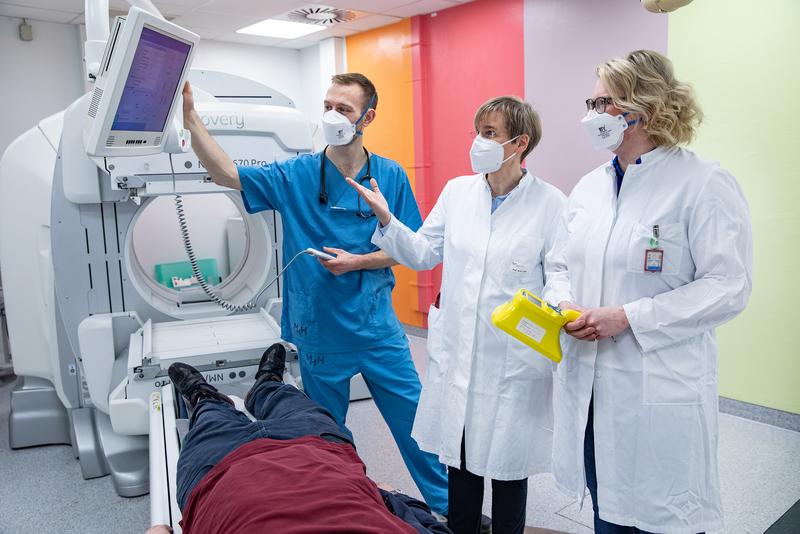
Physician Researchers Drive Healthcare Innovation with PRACTIS Grant

Professor Dr. Dr. Anette Melk (centre) with PRACTIS participants Dr. Johanna Diekmann and Dr. Carl Grabitz during an examination situation in MHH Nuclear Medicine.
Copyright: Karin Kaiser / MHH
MHH programme PRACTIS for the training of clinician scientists is supported with 1.3 million euros for another two years.
In order to provide patients with the best possible care, the latest scientific findings must be incorporated into diagnostics and therapy. This requires so-called clinician scientists. These are doctors who not only have excellent clinical but also scientific training. They carry urgent questions from everyday clinical practice into research and at the same time translate scientific findings into patient care. In this way, they ensure innovations in medical treatment. To ease the difficult balancing act between the laboratory and the bedside, Hannover Medical School (MHH) set up the PRACTIS (Program of Hannover Medical School for Clinician Scientists) junior researcher funding project in 2019 with financial support from the German Research Foundation (DFG). Now the DFG is extending the successful programme and funding it for another two years with 1.3 million euros.
Guaranteed research time
At German university hospitals, the career path for researching physicians is rough, because in addition to the normal clinical routine, there is too little time for demanding research projects. As a result, fewer and fewer are opting for this academic path. The MHH is counteracting this with PRACTIS. The programme is aimed at doctors in the second half of their specialist training. “We thus ensure structured clinical and scientific training, the content of which is precisely tailored to the individual participants,” says Professor Dr. Dr. Anette Melk, spokesperson for the programme.
The three-year funding period is professionally accompanied by mentors. The prospective medical specialists do not spend half of the time in the clinic, but are released for research – their superiors must guarantee this in writing in advance. Thematically, the programme is based on three of the MHH’s main research areas “Infection and Immunology”, “Transplantation and Regeneration” and “Biomedical Engineering and Implants”. However, it is generally open to interested persons from all medical disciplines.
Successful career promotion at the MHH
There is great interest in the funding programme, as evidenced by supraregional applications. “PRACTIS is not only a kind of booster for a career in academic medicine, but at the same time increases the quality of patient care,” explains Professor Melk. The programme builds on successful career programmes for clinician scientists developed at MHH, which the university was the first nationwide to launch back in 2008.
In the meantime, there are different funding opportunities at the MHH for different stages within further medical training. And this is not only good for the further development of medicine and the improvement of patient care, but also for the university itself. “As a pioneer in career promotion, we set standards and are an attractive employer for the brightest minds,” emphasises MHH President Professor Dr. Michael P. Manns.
SERVICE:
For further information, please contact Professor Dr. Dr. Anette Melk, melk.anette@mh-hannover.de or visit http://www.practis-mhh.de.












